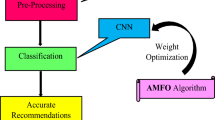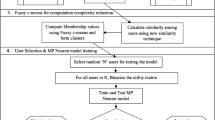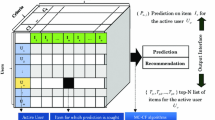Abstract
Recommenders utilize the knowledge discovery-based methods for identifying information required by the user. The recommender system faces some serious challenges in recent years to access exponentially increasing information due to high number of Web site users. Some of the challenges posed in this respect are: The system should assure high-quality recommendations and high coverage even during data sparsity and produce more recommendations per second based on million users. To improve the performance of the recommender system, selecting appropriate features from the available highly redundant information is a crucial task. The feature selection technique will bring down the dimensionality and also discard the redundant and the noise-corrupted features. The collaborative filtering-based methods will make use of the past activities or the preferences like the user ratings or content information of the products to regulate the top references. This work proposes a fuzzy entropy-based deep learning for the content features as well as a feature selection method. Deep learning-based recommender process takes extended important consideration by overwhelming difficulties of conventional models and attaining high reference excellence. A fuzzy entropy-based feature selection technique lowers the dimensionality of hyperspectral data.




Similar content being viewed by others
References
Betru BT, Onana CA, Batchakui B (2017) Deep learning methods on recommender system: a survey of state-of-the-art. Int J Comput Appl 162(10):17–22
Bobadilla J, Ortega F, Hernando A, Gutiérrez A (2013) Recommender systems survey. Knowl Based Syst 46:109–132
Chen Q, Zhang G, Yang X, Li S, Li Y, Wang HH (2017) Single image shadow detection and removal based on feature fusion and multiple dictionary learning. Multimed Tools Appl 77(14):18601–18624
Elahi M, Ricci F, Rubens N (2016) A survey of active learning in collaborative filtering recommender systems. Comput Sci Rev 20:29–50
Huang W, Wang H, Zhang Y, Zhang S (2017) A novel cluster computing technique based on signal clustering and analytic hierarchy model using hadoop. Clust Comput. https://doi.org/10.1007/s10586-017-1205-9:1-8
Lee HM, Chen CM, Chen JM, Jou YL (2001) An efficient fuzzy classifier with feature selection based on fuzzy entropy. IEEE Trans Syst Man Cybern 31(3):426–432
Lu J, Wu D, Mao M, Wang W, Zhang G (2015) Recommender system application developments: a survey. Decis Support Syst 74:12–32
Nilashi M, bin Ibrahim O, Ithnin N (2014) Multi-criteria collaborative filtering with high accuracy using higher order singular value decomposition and neuro-fuzzy system. Knowl Based Syst 60:82–101
Pal M (2011) Fuzzy entropy based feature selection for classification of hyperspectral data. Dimensions and Directions of Geospatial Industry, pp 18–21
Pal M, Foody GM (2010) Feature selection for classification of hyperspectral data by SVM. IEEE Trans Geosci Remote Sens 5:2297–2306
Sarwar B, Karypis G, Konstan J, Riedl J (2000) Application of dimensionality reduction in recommender system-a case study (No. TR-00-043). Minnesota Univ Minneapolis Dept of Computer Science
Wang H, Wang N, Yeung DY (2015) Collaborative deep learning for recommender systems. In: Proceedings of the 21th ACM SIGKDD international conference on knowledge discovery and data mining. ACM, pp 1235–1244
Yang X, Guo Y, Liu Y, Steck H (2014) A survey of collaborative filtering based social recommender systems. Comput Commun 41:1–10
Zhang S, Wang H, Huang W (2017) Two-stage plant species recognition by local mean clustering and Weighted sparse representation classification. Clust Comput 20(2):1517–1525
Zhang S, Wang H, Huang W, You Z (2018) Plant diseased leaf segmentation and recognition by fusion of superpixel, K-means and PHOG. Optik-Int J Light Electron Optics 157:866–872
Zheng L (2016) A survey and critique of deep learning on recommender systems. Technical Report, University of Illinois, Chicago
Zou Q, Ni L, Zhang T, Wang Q (2015) Deep learning based feature selection for remote sensing scene classification. IEEE Geosci Remote Sens Lett 12(11):2321–2325
Author information
Authors and Affiliations
Corresponding author
Ethics declarations
Conflict of interest
The authors declare that they have no conflict of interest.
Ethical approval
All procedures performed in studies involving human participants were in accordance with the ethical standards of the institutional and/or national research committee and with the 1964 Helsinki Declaration and its later amendments or comparable ethical standards.
Informed consent
Informed consent was obtained from all individual participants included in the study.
Additional information
Communicated by P. Pandian.
Publisher’s Note
Springer Nature remains neutral with regard to jurisdictional claims in published maps and institutional affiliations.
Rights and permissions
About this article
Cite this article
Saravanan, B., Mohanraj, V. & Senthilkumar, J. A fuzzy entropy technique for dimensionality reduction in recommender systems using deep learning. Soft Comput 23, 2575–2583 (2019). https://doi.org/10.1007/s00500-019-03807-9
Published:
Issue Date:
DOI: https://doi.org/10.1007/s00500-019-03807-9




